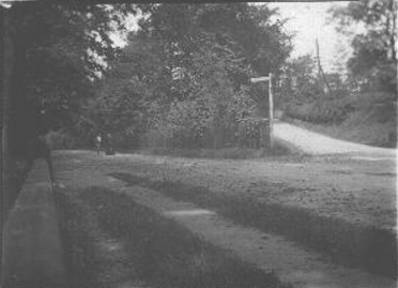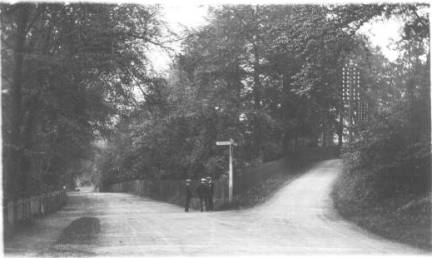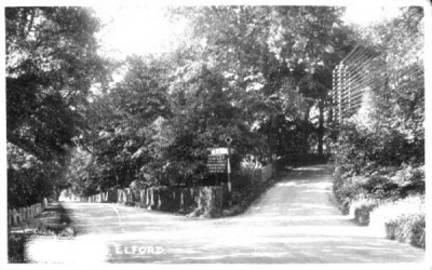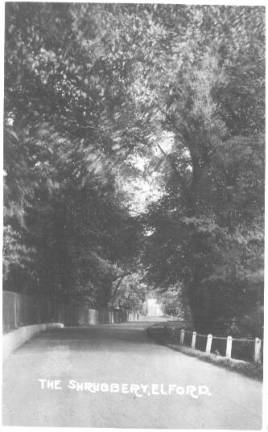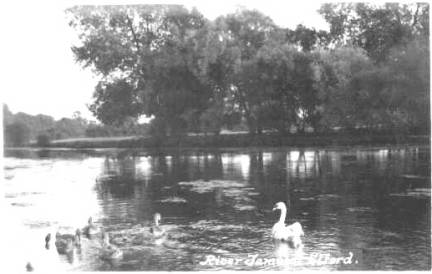FORDS ACROSS
THE RIVER AT ELFORD
Three
roads ran North and East from the settlement at Fisherwick and Elford, crossing the river by fords which wete described in
1766 as often impassable. The most northerly lay to the north east of Fisherwick Hall and was known as Fisherwick Ford in
the 16th Century.
The
second road followed an Iron Age track leading to the river. Its ford was known
as Elford Hall ford. In 1600 there was a ferry there, and the crossing was known in 1766 as Elford Ford or Elford Ferry.
Interestingly
where the Old Hall used to be is a substantial iron eye et in the ground near
the river. Presumably this is the where the rope for the ferry was fixed to.
It is roughly on a line with where the old iron age track used to be.
It is around that track that there have been archaeological excavations of the Neolithic/roman occupation
of the land .
The
third and most southerly road ran through Timmor and crossed the tame by a ford at Elford Mill known as Broad ford in the 13th century. The road was then
known as Sropstreteweye, probably meaning the Shrewsbury or Shropshire Road. It continued west from Fisherwick to Lichfield
via Huddlesford lane in Whittington., and in the early part of the 16th century it was part of the way from Leicester
to Lichfield.
In 1599 the road was described as difficult, especially in winter
The
roads radiating from the former hamlet of Fisherwick ran through Fisherwick Park
until the latter part of the 18th Century. They were stopped up as art of an Act in 1766 as part of Lord Donnegals
improvement of the park.
In
return he built a bridge over the Tame at Elford north of Elford Mill. He assumed
responsibility for its maintenance and for the upkeep of the road as far as Hademore.
B uilt of pink sandstone the bridge consists of three arches over the main part of the river and an eight arch flood section to the west.
Also
in 1766 Lord Donegal granted the Lord of Elford and his servants a right of way
through the park in a straight line from the gate wheer the road from Elford Ford entered the park, across to Hademore gate.
The right covered pedestrians, horses and carriages buy not carts.
In 1911 H F Pagett
as Lord of Fisherwick, and his eldest son F E Pagett made an agreement with Lichfield
Rural District Council for the maintenance of the Whittington Road. During the lifetime of the Pagetts., who agreed
to pay for it.
It is fortunate that no one person is responsible for that
maintenance today. The repairs that have had to be made to the bridge in recent years would be ruinous.
From - History of Stafford by M Greenslade
(Full of information)
1765 Advic e given to Elford
Hall re Bages Construction of a
footbridge Crossing by Paper Mill (Elford Hall collection Birmingham Archives)
Bage was a business man and author who lived at Elford Mill.
There
has been a ferry at Elford since time immemorial - To the great detriment of Which Bage owner and occupier of a paper mill, an island opposite to it and of
the water thereabouts hath lately needed a footbridge made within a measured mile of the aforesaid ferry.
It
is asked whether an action will not lay against Bage for needing a bridge greatly detrimental to the ferry, which the owner
of Elford Hall has kept up time immemorial, it is obliged to keep up, notwithstanding the said bridge is built upon Bages
own land - and goes over his own water. And the action (if it will lay) should be bought in the name of the owner of Elford
Hall, or in the mans name who rents the ferry.
I
am of the opinion that as the owner of Elford Hall has a ferry by prescription, which he is obliged to maintain, any person
who offers any other passage upon the river, whether by another ferry or by another bridge as to prejudice the ancient ferry
is liable to be sued in an action on the case. For as the law lays the onus of maintaining the ferry it also gives him a profit
of an exclusive right of passage. And therefore whether Bage makes any profit or no of his bridge(which is not stated), an
action will lie against him: but if he has made a profit of it Damages will be the more considerable. The construction of
Bages bridge being built on his own land and coming over his own water are immaterial in this case. If he permits other than
his own family to use it, for the rule of law is Sic utere
I think the action should be brought in the
name of J Pennant of the ferry, otherwise the owner of Elford Hall may possibly be obliged to prove a decrease in rent in
order to prove the damages.
H Blackstone
Carey Street 23 Jan 1765
***




